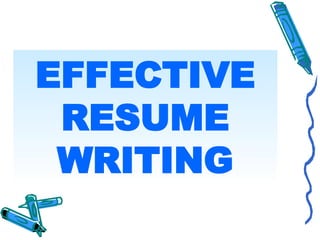Effective Resume Writing
- 2. What is a Resume? It is a summary of your academics & work history NO
- 3. Resume is a True Depiction ’āśPersonality ’āśBackground Resume ’āśCapabilities is an advertisemen ’āśAccomplishments t that helps ’āśHow organized you are you sell ’āśYour Sense of Quality yourself to an Employer
- 4. What Can a Resume Will Do For You? ’āśMakes the first impression about The you. interview ’āśHelps organize your thoughts gets you ’āśHighlights the relevant facts the job, about you, your education, and your experience. ’āśPositions you in the mind of the employer, thus creating a value. The resume ’āśBe a basis for the interviewer to gets you the justify your hiring interview
- 5. Why Give Importance to Resume ’āśCompetition being fierce, you need not just Resumes but ŌĆ£Attention Grabbing Resumes.ŌĆØ ’āśFirst point of interaction between employer & you. ’āśSpend time on preparing targeted, effective and error free document. ’āśUsually, a Hiring Manager spends not more than15 ŌĆō 20 seconds per Resume. ’āśA clear & crisp resume will qualify you for the INTERVIEW
- 6. Essentials of a Resume ’āśObjective/Personal Statement ’āśPersonal Details ’āśEducational Qualification ’āśProfessional Experience ’āśTechnical Qualification ’āśCore Competencies ’āśSkills (area of expertise) ’āśAchievements ’āśReferences
- 7. Tips for writing a great resume Write Resume with a target in mind and be appropriate ’ā╝Customization of resume can increased chances of short listing. ’ā╝Analyze the job ads and job descriptions and compose the resume to address the requirements. ’ā╝Do not shoot same resume to all jobs.
- 8. Tips for writing a great resume Highlight your strengths ’ā╝To prove you are a better choice than competition describe: ’ā╝Specific Achievements/Targets achieved ’ā╝New Accounts added/Value additions in previous jobs ’ā╝Mention the technology/skills used in different projects.
- 9. Tips for writing a great resume Keep it short & Simple ’ā╝Always write a moderate size resume ’ā╝Use the right font size. ’ā╝Recruiters are interested in the latest experience/job/qualifications so maintain the chronological order- Very important
- 10. Tips for writing a great resume Ensure Correctness ’ā╝Make sure to mention correct employments dates & designations ’ā╝Employer can use a background check to validate the information. ’ā╝If the data in resume is a fake your chances are zero ŌĆō Be careful
- 11. Tips for writing a great resume Check for Grammar & Typing Mistakes ’ā╝No excuses for typing mistakes, grammatical errors and spelling. All PC have this features to check this. ’ā╝Use Action Verbs to demonstrate that you are a person who initiate and proact. Action Verbs Organized Directed Planned Created Assisted Initiated Analyzed Developed Managed
- 12. Tips for writing a great resume Make the Best first Impression ’ā╝Use best quality paper & printer. ’ā╝Good formatting may not get you a job but Bad formatting will definitely reduce your chances ’ā╝If sending resume by email use PDF format if possible - Looks good. ’ā╝Avoid sending photocopied or pre written resume ŌĆō makes bad impression ’ā╝Choose a font style that looks professional. Avoid multiple fonts as it looks cluttered & busy.
- 13. DONŌĆÖtŌĆÖS in Effective Resume Writing ’āśDonŌĆÖt state your expectations out of the job rather tell what you can contribute. ’āśDo not list the names of your supervisors/contact info of your past employment. ’āśBe careful with the dates. Make sure every year is accounted for .Employers will get suspicious if they see too many gaps. ’āśDo not disclose the salary, reasons for leaving previous employment and your availability to start the new job- Keep them to be discussed in interview. ’āśDo not be wordy while listing job responsibilities, use bullets and in a consistent style. ’āśPaste photograph and furnish references if asked to do so. ’āś Use Simple & Plain language. Avoid professional jargon.
- 14. Please Remember Your Resume is a A Simple Marketing Brochure for YOU !!!
- 15. Q&A THNAK YOU















